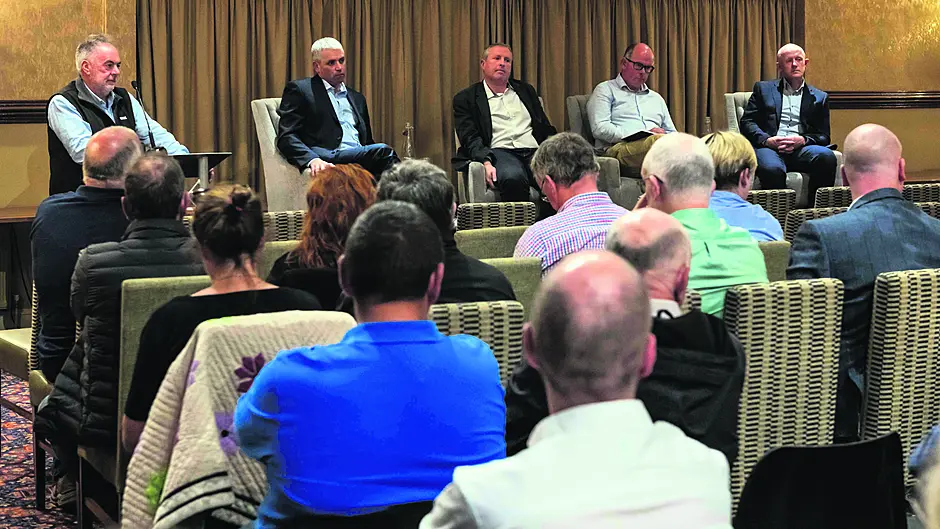Farmers are concerned that any reduction in the current nitrates derogation rate could devastate the industry, but there may still be time to lobby Europe, reports Emma Connolly
IT’S crucial that dairy farmers and stakeholders get their voices heard in Dublin and Brussels over the coming weeks if there’s any chance of keeping the nitrates derogation at 250.
The fall-out of it dropping to 220 would be ‘carnage’, said Sen Tim Lombard (FG), who organised a meeting on the controversial issue in the Clonakilty Park Hotel on Monday night.
While he acknowledged that it was ‘late in the day’ to be organising a campaign¬ – a decision will be made by the European Commission within six weeks – he insisted it wasn’t too late. The senator and dairy farmer said it will be his only priority when the Dáil resumes in a fortnight.
‘It will kill us if we get this wrong,’ he said.
The issue facing dairy farmers was well established at a recent IFA rally in Bandon, but was outlined again at the meeting. If the European Commission decides that sufficient improvements have not been met at its interim review of water quality, it will reduce the derogation from 250 to 220, impacting stocking levels by an average of 10-12%.
For a farmer with 100 cows, that would be a cut to 88, and an income loss of 29% from next January.
The packed meeting was also addressed by Enda Buckley, director of sustainability at Carbery, and Eddie Burgess, agriculture and catchment specialist with Teagasc.
While describing water quality as ‘complex’, Mr Burgess said that reducing stocking levels won’t impact water quality, and that’s the message they’re sending to Brussels.
Farmers expressed disbelief that the science from the Timoleague catchment survey to support this claim ws not enough to support the bid to retain the 250 derogation. Mr Burgess said while the findings were recognised, it was not to the extent he’d like.
The trends in Timoleague were positive, he said. ‘We must learn from it and put it nationally,’ he told the meeting.
Enda Buckley told the audience that he was confident that farmers will reach carbon emission targets, but he said derogation was a ‘much bigger issue’.
On a positive note, he said, the Chinese consulate in Beijing had just contacted Farm Zero C in Shinagh looking for more information on the ground-breaking work being done there. The project is striving to be an economically viable, carbon-neutral dairy farm.
He pointed out that in 2019, Shinagh farm had a carbon footprint of 0.86, which had reduced to 0.66 last year, compared to a national average of 0.9 –– and it is in derogation.
‘Derogation can be seen as an ugly word, but farmers in derogation are often the ones who go the extra mile,’ said Mr Buckley.
He spoke of the economic impact of derogation, and the ‘decimation’ facing farmers with 65-70 cows if they are hit with a 12% destocking.
‘Two thirds of our suppliers are in derogation so it’s substantial. It is going to be very unfair on the 60-80 cow man. Our average supplier has 90 cows, so the majority of our farmers are in this space. We invited the commission to come and see Shinagh, and we believe a group is coming in October. It may be too late but it may not be. Behind the scenes, Carbery has been very active on this, I can assure you. The last thing we want is reduced supplies from our suppliers.’
He urged people to ‘give it everything’ until the end of September.
‘Back in January we heard it was a done deal, but there’s a sense we’ve clawed back a bit and farmers have to make noise on this,’ he said.
John Fitzgerald, head of agri banking for Munster with Bank of Ireland, said they would have to review and respond to any changes to the 250 level. However, he said, farmers had a track record of resilience, as was shown by Brexit.
Comments from farmers on the floor said the government had ‘sleep walked into this’ while another suggested the Department would be better off banning Can [calcium ammonium nitrate] instead of ‘sacrificing cows’.
Several attendees spoke with frustration at some farmers’ non-compliance at spreading slurry during the closed season, and urged the Department of Agriculture to take action ‘instead of hitting farmers doing their job.’
Other challenges for the sector, such as succession, labour and the need for Tams assistance to invest in additional slurry storage, were raised.
Peter Fleming, chairman of Barryroe Co-op, said the onus was on the sector to defend itself. ‘The government asked us to expand by 50% and we did, and now every day there’s a new rule or condition being put on us – the next generation are beaten before they even start. It would be a crime in areas where there’s good productive land, not to make use of it in a world where there’s hunger. We have to get this message across. If you take the cow out of West Cork there’s not much left in terms of industry,’ he said.
The European Commission’s decision will be based on a review of water quality, not just in the Teagasc six catchments, but in the EPA’s 5,000 monitoring sites.
Sen Lombard said the meeting wasn’t about ‘EPA bashing’ but he described the body as being ‘out of control at the moment’. His comments were sparked by a tweet earlier this week by the EPA which suggested people cut back on their intake of red meat. The tweet was later deleted after objections from the IFA.
He also said the understanding of commercial farming is very limited in Dublin.
‘The next 10 days are vital. We need to get the right recommendations going to Europe,’ he said.
The Department of Housing, Local Government and Heritage is the lead government department in relation to the nitrates regulations but chair of ICMSA West Cork, Eileen Calnan, said they had repeatedly invited Minister Darragh O’Brien to the area, but have had no response.
Chair of West Cork IFA Donal O’Donovan said politicians now have the biggest role to play.
John O’Brien, who chaired the meeting, and who is vice-chair of Barryroe Co-op, urged those attending to make their feelings known about what is ultimately their future.
‘It’s got to be 250 or nothing,’ he said.










